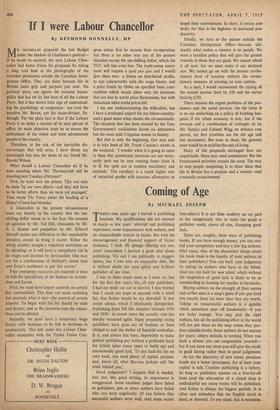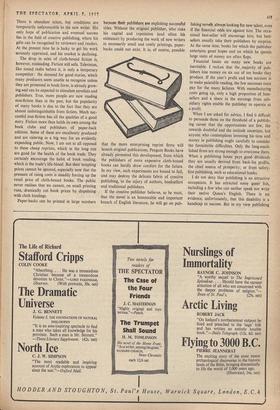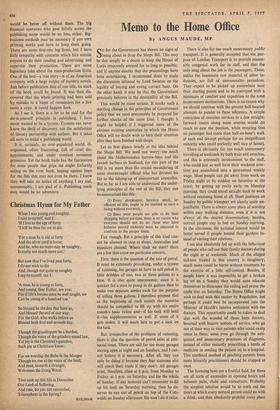Coming of Age
By MICHAEL JOSEPH rr WENTY-ONE years ago I started a publishing 1 business. My qualifications did not amount to much—a few years' editorial and publishing experience, some acquaintance with authors, and an unquenchable interest in books. But with the encouragement and financial support of Victor Gollancz, I took tii:e plunge. During our two years' association 1 learned a great deal about publishing. VG and I are politically at daggers drawn, but I owe him an unpayable debt. He is without doubt the most gifted and brilliant publisher of our time.
I was to learn much more as I went on, but for the first few years, like all new publishers, I had my work cut out to survive. I was warned that I could not hope to succeed with a small list, that fiction would be my downfall. It was sound advice, which I obstinately disregarded. Publishing firms fell like ninepins between 1936 and 1939: in recent years the casualty rate has sharply increased again. Many promising young publishers have gone out of business or been obliged to seek the shelter of financial umbrellas. It is, and always has been, impossible to make general publishing pay without a profitable back list (which takes many years to build up) and uncommonly good luck. To put back-list fat on your back, you need plenty of capital, patience and, above all, what flat-race jockeys call 'the wind behind you.'
Good judgement? I suppose that is needed, too; but, like good writing, its importance is exaggerated. Some excellent judges have failed as publishers, just as many authors have failed who can write angelically. (If you believe that successful authors write well, read some recent best-sellers.) It is not false modesty on my part to say categorically that to make the grade a publisher needs, above all else, thumping good luck.
There are, roughly, three ways of publishing books. If you have enough money, you can out- bid your competitors and buy a few big authors. (Not many. One of the pleasantest things about the book trade is the loyalty of most authors to their publishers.) You can back your judgement by taking on authors who have so far failed. And you can look for new talent, which without the magnetism of good luck is likely to be as unrewarding as hunting for needles in haystacks.
Buying authors on the strength of their names and earlier sales is a mug's game if you pay (and you usually have to) more than they are worth. Taking on unsuccessful authors is a gamble which sometimes pays off handsomely—if you are lucky enough. You may pick the right authors, but all the publishing effort in the world will not put them on the map unless they pro- duce saleable books. Some authors do'not mature for years : others dwindle to nothing. When you back a winner you can congratulate yourself— but if you have any sense you will give the credit to good timing rather than to good judgement.
As for the discovery of new talent, premium bonds are a better investment, for at least your capital is safe. Creative publishing is a lottery. So long as publishers operate on a free-for-all basis (and the alternative of a closed shop is unthinkable) too many books will be published. And fiction is always the biggest gamble. It is often said nowadays that the English novel is dead, or doomed. To my mind, this is nonsense. There is abundant talent, but conditions arc temporarily unfavourable to the new writer. His only hope of publication and eventual success lies in the field of creative publishing, where his gifts can be recognised by reviewers and readers. At the present time he is lucky to get his work seriously appraised, and his market is declining.
The drop in sales of cloth-bound fiction is, however, misleading. Fiction still sells. Television, like sound radio before it, is only a temporary competitor : the demand for good stories, which many producers seem unable to recognise unless they are presented in book form, is already grow- ing and can be expected to stimulate novelists and publishers. True, more people are now reading non-fiction than in the past, but the popularity of many books is due to the fact that they are almost indistinguishable from fiction. Much suc- cessful non-fiction has all the qualities of a good story. Fiction more than holds its own among the book clubs and publishers of paper-back editions. Some of these are excellently produced and are catering in a big way for an evidently expanding public. Now, 1 am not at all opposed to these cheap reprints, which in the long run are good for the health of the book trade. They certainly encourage the habit of book reading, which is the trade's life-blood. But their tempting prices cannot be ignored, especially now that the pressure of rising costs is steadily forcing up the retail price of cloth-bound books. The public never realises that we cannot, on small printing runs, drastically cut book prices by dispensing with cloth bindings.
Paper-backs can be printed in large numbers because their publishers are exploiting successful titles. Without the original publisher, who risks his capital and reputation (and often his existence) by producing the work of new writers in necessarily small and costly printings, paper- backs could not exist. It is, of course, possible that the more enterprising reprint firms will launch original publications. Penguin Books have already pioneered this development, from which the publishers of more expensive cloth-bound books can hardly draw comfort for the future. In my view, such experiments are bound to fail, and may destroy the delicate fabric of creative publishing, to the injury of authors, booksellers and traditional publishers.
If the creative publisher believes, as he must, that the novel is an honourable and important branch of English literature, he will go on pub- lishing novels, always looking for new talent, even if the financial odds are against him. The occa- sional best-seller will encourage him, but best- sellers usually take their publishers by surprise. At the same time, books for which the publisher entertains great hopes and on which he spends large sums of money are often flops.
Financial losses on many new books are inevitable. I reckon that the ,majority of pub- lishers lose money on six out of ten books they produce. If the year's profit and loss account is to make palatable reading, the few successes must pay for the many failures. With manufacturing costs going up, only a high proportion of best- sellers and a share in the earnings from sub- sidiary rights enable the publisher to operate at a profit.
When I am asked for advice, I find it difficult to persuade those on the threshold of a publish- ing career that the opportunities are few, the rewards doubtful and the outlook uncertain, but anyone who contemplates investing his time and money in publishing ought carefully to consider the formidable difficulties. Only the long-estab- lished firms are strong enough to overcome them. When a publishing house pays good dividends they are usually derived from back-list profits, the chief source of prosperity; or from safety- first publishing, such as educational books.
I do not deny that publishing is an attractive occupation. It has attracted some queer fish, including a few who can neither speak nor write their native Queen's English. There is no evidence, unfortunately, that this disability is a handicap to success. But in my view publishing would be better off without them. The big financial operators who pass fitfully across the publishing scene would be no loss, either. Big- business methods may be necessary if you own printing works and have to keep them going. There are some first-rate big firms, but I have little sympathy with concerns which hire outside experts to do their reading and advertising, and supervise their production. There are some legendary tales about the mass-production firms. One of the best—a true story—is of an American company with a large output of mystery novels. Just before publication date of one title, no stock of the book could be found. It was then dis- covered that the whole printing had been sold by mistake to a buyer of remainders for a few cents a copy. It could happen here.
As I see it, there is a lot to be said for the do-it-yourself principle in publishing. I have never wanted to be a tycoon. Tycoons can never know the thrill of discovery, nor the satisfaction of literary partnership with authors. But it takes all sorts to make a publishing world.
It is, certainly, an over-populated world, ill- organised, often frustrating, full of cruel dis- appointments, and under constant economic pressures. Yet the book trade has the fascination for some people that grips the angler forlornly sitting on the river bank, hoping against hope for the fish that may not even be there. I know they will take no notice of anything I say and, unreasonably, I am glad of it. Publishing made easy would be no adventure.














































 Previous page
Previous page